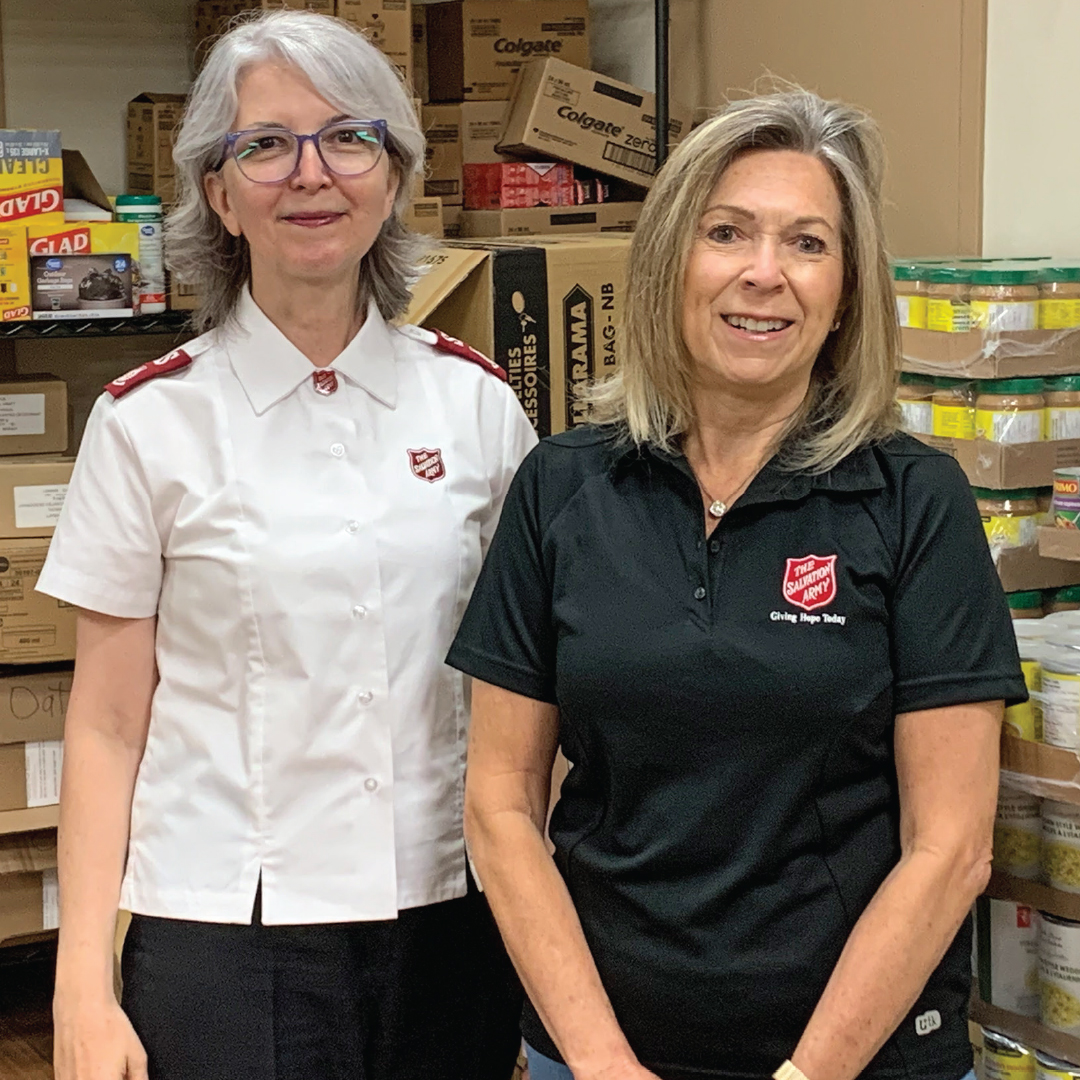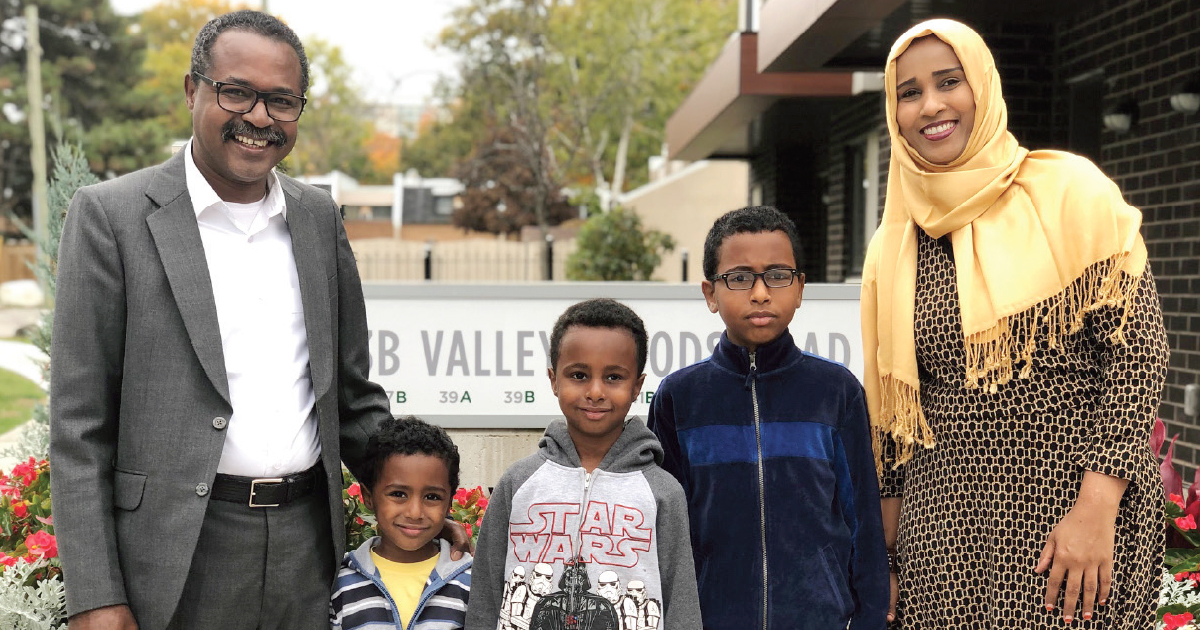(Above) “Every time we went to The Salvation Army, they greeted us with a smiling face,” says Tariq Duffuaa (left), pictured here with his wife, Areej Adam, and their children
From May 2020 to May 2021, 5,883 people received assistance from The Salvation Army Yorkminster Citadel in Toronto. Their community and family services offers a food bank, emergency assistance with clothing and household items, immigrant and refugee referrals, an English conversation café, a seniors’ luncheon and community kitchen, and Christmas assistance. Unfortunately, several activities had to be put on hold or amended due to COVID-19.
“The pandemic brought an increased demand on our food bank,” says Liz Colley, community and family services manager, noting a 48-percent rise in the number of families seeking food assistance each week from the first quarter of 2021 compared to the four months prior to the WHO’s declaration of the pandemic (November 2019 to February 2020).
Here are just two of the many examples of how The Salvation Army provided care during a time of need:
“Don’t Worry”
Fleeing turmoil and increasingly violent protests in their home country of Sudan, Tariq Duffuaa, his wife, Areej Adam, and their children arrived in Canada in July 2019, feeling uncertain about the journey ahead.
“We were most worried about our kids and how we would feed them,” says Tariq of his sons, who are four, six and 10 years old. “Before, we lived a financially good life because my wife was a doctor and I was an accountant. We were good.
“But then we lost everything.”
To get by, the family stayed in shelters and received support from community organizations, including Yorkminster Citadel.
Tariq’s family was able to transition from a shelter to an apartment. Since most of their money went toward rent, having regular food and clothing assistance from the Army lifted a huge burden.
“My kids needed many items such as winter clothes and boots, which are very expensive,” says Tariq. “Even gifts at Christmas … The Salvation Army surprised me about that. It meant a lot to us.”
The family has applied for permanent residency in Canada and hope to one day become Canadian citizens. Areej has been studying English and is preparing to work as a physician.
“Every time we went to The Salvation Army, they greeted us with a smiling face, asked us about our situation, and gave us advice and warm words: ‘Don’t worry, everything will be OK. We support you here,’ ” says Tariq. “Every time, every time.”
 Major Pauline Gruer-Caulfield (left) and Liz Colley provided a warm welcome
Major Pauline Gruer-Caulfield (left) and Liz Colley provided a warm welcome
Beyond Food Support
Risikat and her family came to Canada from Nigeria in 2018. At the time, Risikat’s son was only 18 months old and she was pregnant with her second child. Despite having university degrees in economics and accounting, Risikat and her husband, Mukaila, struggled to find meaningful work.
The family lived in shelters as Mukaila found employment as a personal support worker. Eventually, they were able to move into an apartment and sought help from the Army during the transition.
“We were paying $1,850 for rent, so most times, we had to manage with whatever was left,” says Risikat. “Sometimes we would miss out on things such as groceries for the kids.
“There’s always a difference in the house after we visit the Army food bank because we get a variety of things, options of cereals, and snacks that the kids like. Everyone is happy.”
She also recalls the joy of receiving Christmas gifts and vouchers to purchase seasonal items at grocery stores and the Salvation Army thrift store. But what touched Risikat’s heart the most was when the Army was present during a time of tremendous grief.
“I lost my daughter last year,” she says of her two-month-old, who never left the hospital. “The pastor at that time, Major Pauline Gruer-Caulfield, was always calling me. We prayed together, she gave me words of encouragement and provided plenty of resources to help me with the grief.
“It was so wonderful to have that spiritual and mental support.”
Risikat participated in Pathway of Hope, the Army’s one-on-one case-management program, which helps individuals set goals for themselves and supports them as they take action steps to improve their lives. Through the program, she received help with her resumé, gained newfound confidence and graduated in March 2021. When she mentioned how challenging it was to look for work without a computer, a church member donated a laptop. Within a week of setting it up, Risikat was hired and felt grateful that she could contribute to the family’s expenses.
“Now, I’m working from home and we can buy anything we want at any time,” she says. “My family is happy and we are comfortable.”
Melissa Yue Wallace is a journalism graduate and freelance writer who is passionate about helping people in need and encouraging the organizations that work tirelessly to care for them. By writing, she finds meaning in amplifying the voices of people who don’t often have their stories told. Melissa lives in Richmond Hill, Ont., with her husband and twin children.
This story is from:










Leave a Comment